formerly eScholarship Editions


|
|
|
|
Your request for similar items found 20 book(s). | Modify Search | Displaying 1 - 20 of 20 book(s) | |
| 1. | 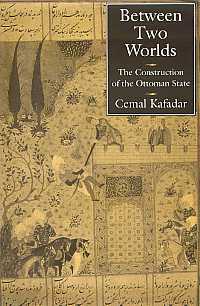 | Title: Between two worlds: the construction of the Ottoman state Author: Kafadar, Cemal 1954- Published: University of California Press, 1995 Subjects: History | Politics | Middle Eastern History | Middle Eastern Studies | Medieval History | Medieval Studies Publisher's Description: Cemal Kafadar offers a much more subtle and complex interpretation of the early Ottoman period than that provided by other historians. His careful analysis of medieval as well as modern historiography from the perspective of a cultural historian demonstrates how ethnic, tribal, linguistic, religious, and political affiliations were all at play in the struggle for power in Anatolia and the Balkans during the late Middle Ages.This highly original look at the rise of the Ottoman empire - the longest-lived political entity in human history - shows the transformation of a tiny frontier enterprise into a centralized imperial state that saw itself as both leader of the world's Muslims and heir to the Eastern Roman Empire. [brief] Similar Items |
| 2. | 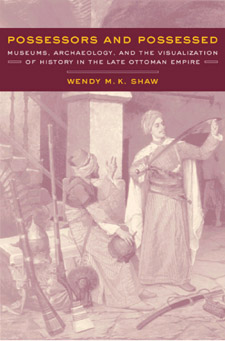 | Title: Possessors and possessed: museums, archaeology, and the visualization of history in the late Ottoman Empire Author: Shaw, Wendy M. K 1970- Published: University of California Press, 2003 Subjects: History | Middle Eastern Studies | Art | Middle Eastern History Publisher's Description: Possessors and Possessed analyzes how and why museums - characteristically Western institutions - emerged in the late-nineteenth-century Ottoman Empire. Shaw argues that, rather than directly emulating post-Enlightenment museums of Western Europe, Ottoman elites produced categories of collection and modes of display appropriate to framing a new identity for the empire in the modern era. In contrast to late-nineteenth-century Euro-American museums, which utilized organizational schema based on positivist notions of progress to organize exhibits of fine arts, Ottoman museums featured military spoils and antiquities long before they turned to the "Islamic" collections with which they might have been more readily associated. The development of these various modes of collection reflected shifting moments in Ottoman identity production. Shaw shows how Ottoman museums were able to use collection and exhibition as devices with which to weave counter-colonial narratives of identity for the Ottoman Empire. Impressive for both the scope and the depth of its research, Possessors and Possessed lays the groundwork for future inquiries into the development of museums outside of the Euro-American milieu. [brief] Similar Items |
| 3. | 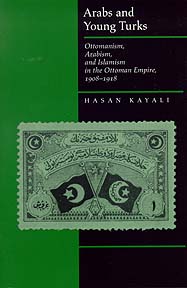 | Title: Arabs and Young Turks: Ottomanism, Arabism, and Islamism in the Ottoman Empire, 1908-1918 Author: Kayalı, Hasan Published: University of California Press, 1997 Subjects: History | Middle Eastern History | Middle Eastern Studies | Politics Publisher's Description: Arabs and Young Turks provides a detailed study of Arab politics in the late Ottoman Empire as viewed from the imperial capital in Istanbul. In an analytical narrative of the Young Turk period (1908-1918) historian Hasan Kayali discusses Arab concerns on the one hand and the policies of the Ottoman government toward the Arabs on the other. Kayali's novel use of documents from the Ottoman archives, as well as Arabic sources and Western and Central European documents, enables him to reassess conventional wisdom on this complex subject and to present an original appraisal of proto-nationalist ideologies as the longest-living Middle Eastern dynasty headed for collapse. He demonstrates the persistence and resilience of the supranational ideology of Islamism which overshadowed Arab and Turkish ethnic nationalism in this crucial transition period. Kayali's study reaches back to the nineteenth century and highlights both continuity and change in Arab-Turkish relations from the reign of Abdulhamid II to the constitutional period ushered in by the revolution of 1908. Arabs and Young Turks is essential for an understanding of contemporary issues such as Islamist politics and the continuing crises of nationalism in the Middle East. [brief] Similar Items |
| 4. | 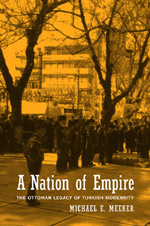 | Title: A nation of empire: the Ottoman legacy of Turkish modernity Author: Meeker, Michael E Published: University of California Press, 2002 Subjects: Anthropology | Middle Eastern Studies | Cultural Anthropology | Middle Eastern History Publisher's Description: This innovative study of modern Turkey is the result of many years of ethnographic fieldwork and archival research. Michael Meeker expertly combines anthropological and historical methods to examine the transition from the Ottoman Empire to the Turkish Republic in a major region of the country, the eastern Black Sea coast. His most significant finding is that a state-oriented provincial oligarchy played a key role in successive programs of reform over the course of more than two hundred years of imperial and national history. As Meeker demonstrates, leading individuals backed by interpersonal networks determined the outcome of the modernizing process, first during the westernizing period of the Empire, then during the revolutionary period of the Republic.To understand how such a state-oriented provincial oligarchy was produced and reproduced along the eastern Black Sea coast, Meeker integrates a contemporary ethnographic study of public life in towns and villages with a historical study of official documents, consular reports, and travel narratives. A Nation of Empire provides anthropologists, historians, and students of Eastern Europe and the Middle East with a new understanding of the complexities and contradictions of modern Turkish experience. [brief] Similar Items |
| 5. | 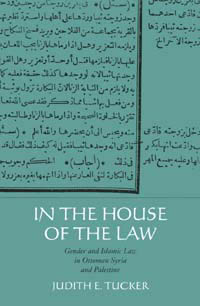 | Title: In the house of the law: gender and Islamic law in Ottoman Syria and Palestine Author: Tucker, Judith E Published: University of California Press, 1998 Subjects: History | Middle Eastern History | Law | Islam | Women's Studies | Middle Eastern Studies | Islam Publisher's Description: In an rewarding new study, Tucker explores the way in which Islamic legal thinkers understood Islam as it related to women and gender roles. In seventeenth and eighteenth century Syria and Palestine, Muslim legal thinkers gave considerable attention to women's roles in society, and Tucker shows how fatwa s, or legal opinions, greatly influenced these roles. She challenges prevailing views on Islam and gender, revealing Islamic law to have been more fluid and flexible than previously thought. Although the legal system had a consistent patriarchal orientation, it was modulated by sensitivities to the practical needs of women, men, and children. In her comprehensive overview of a field long neglected by scholars, Tucker deepens our understanding of how societies, including our own, construct gender roles. [brief] Similar Items |
| 6. | 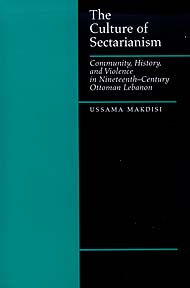 | Title: The culture of sectarianism: community, history, and violence in nineteenth-century Ottoman Lebanon Author: Makdisi, Ussama Samir 1968- Published: University of California Press, 2000 Subjects: History | Middle Eastern History | Middle Eastern Studies | Postcolonial Studies | Islam | Cultural Anthropology Publisher's Description: Focusing on Ottoman Lebanon, Ussama Makdisi shows how sectarianism was a manifestation of modernity that transcended the physical boundaries of a particular country. His study challenges those who have viewed sectarian violence as an Islamic response to westernization or simply as a product of social and economic inequities among religious groups. The religious violence of the nineteenth century, which culminated in sectarian mobilizations and massacres in 1860, was a complex, multilayered, subaltern expression of modernization, he says, not a primordial reaction to it. Makdisi argues that sectarianism represented a deliberate mobilization of religious identities for political and social purposes. The Ottoman reform movement launched in 1839 and the growing European presence in the Middle East contributed to the disintegration of the traditional Lebanese social order based on a hierarchy that bridged religious differences. Makdisi highlights how European colonialism and Orientalism, with their emphasis on Christian salvation and Islamic despotism, and Ottoman and local nationalisms each created and used narratives of sectarianism as foils to their own visions of modernity and to their own projects of colonial, imperial, and national development. Makdisi's book is important to our understanding of Lebanese society today, but it also makes a significant contribution to the discussion of the importance of religious discourse in the formation and dissolution of social and national identities in the modern world. [brief] Similar Items |
| 7. | 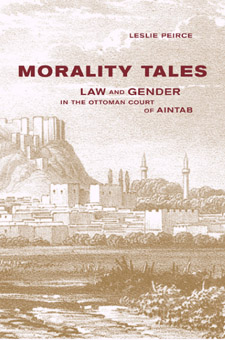 | Title: Morality tales: law and gender in the Ottoman court of Aintab Author: Peirce, Leslie P Published: University of California Press, 2003 Subjects: History | Middle Eastern Studies | Middle Eastern History | Gender Studies Publisher's Description: In this skillful analysis, Leslie Peirce delves into the life of a sixteenth-century Middle Eastern community, bringing to light the ways that women and men used their local law court to solve personal, family, and community problems. Examining one year's proceedings of the court of Aintab, an Anatolian city that had recently been conquered by the Ottoman sultanate, Peirce argues that local residents responded to new opportunities and new constraints by negotiating flexible legal practices. Their actions and the different compromises they reached in court influenced how society viewed gender and also created a dialogue with the ruling regime over mutual rights and obligations. Locating its discussion of gender and legal issues in the context of the changing administrative practices and shifting power relations of the period, Morality Tales argues that it was only in local interpretation that legal rules acquired vitality and meaning. [brief] Similar Items |
| 8. |  | Title: The long peace: Ottoman Lebanon, 1861-1920 Author: Akarlı, Engin Deniz Published: University of California Press, 1993 Subjects: History | Politics | Middle Eastern History | Middle Eastern Studies Publisher's Description: Long notorious as one of the most turbulent areas of the world, Lebanon nevertheless experienced an interlude of peace between its civil war of 1860 and the beginning of the French Mandate in 1920. Engin Akarli examines the sociopolitical changes resulting from the negotiations and shifting alliances characteristic of these crucial years.Using previously unexamined documents in Ottoman archives, Akarli challenges the prevailing view that attributes modernization in government to Western initiative while blaming stagnation on reactionary local forces. Instead, he argues, indigenous Lebanese experience in self-rule as well as reconciliation among different religious groups after 1860 laid the foundation for secular democracy. European intervention in Lebanese politics, however, hampered efforts to develop a correspondingly secular notion of Lebanese nationality.As ethnic and religious strife increases throughout much of eastern Europe and the Middle East, the Lebanese example has obvious relevance for our own time. [brief] Similar Items |
| 9. | 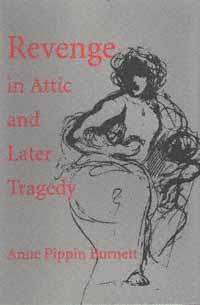 | Title: Revenge in Attic and later tragedy Author: Burnett, Anne Pippin 1925- Published: University of California Press, 1998 Subjects: Classics | Classical Literature and Language | Literature in Translation Publisher's Description: Modern readings of ancient Athenian drama tend to view it as a presentation of social or moral problems, as if ancient drama showed the same realism seen on the present-day stage. Such views are belied by the plays themselves, in which supremely violent actions occur in a legendary time and place distinct both from reality and from the ethics of ordinary life. Offering fresh readings of Attic tragedy, Anne Pippin Burnett urges readers to peel away twentieth-century attitudes toward vengeance and reconsider the revenge tragedies of ancient Athens in their own context.After a consideration of how our view of Elizabethan drama has obscured an accurate view of the ancient tragedies, Burnett reviews early Greek notions of vengeance as expressed in the Odyssey , Heracles' tales, Pindar's odes, Attic judicial processes, and the legend of Harmodius and Aristogeiton. Then, setting aside post-Platonic and Judeo-Christian notions of criminality, she provides new interpretations of all the Attic tragedies in which revenge is a central theme: Aeschylus' Libation Bearers , Sophocles' Ajax, Electra, and Tereus , and Euripides' Children of Heracles, Hecuba, Medea, Electra, and Orestes. Burnett shows that for the ancients, revenge meant a redress of imbalances in both human and divine worlds, achieved through human actions. The vengeful heroines thus appear in a new light. Electra, Hecuba, Medea, and others cease to be the picture of depravity in dramas that are grotesque and sensational, and are instead representative human figures who respond with grandeur to the outsize demands of necessity and supernatural powers. [brief] Similar Items |
| 10. | 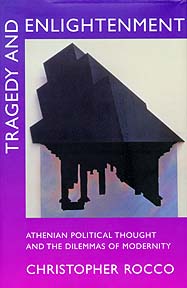 | Title: Tragedy and enlightenment: Athenian political thought, and the dilemmas of modernity Author: Rocco, Christopher 1958- Published: University of California Press, 1997 Subjects: Classics | Classical Philosophy | Classical History | Classical Literature and Language | Social and Political Thought | Social Theory Publisher's Description: Weaving together ancient Greek texts and postmodernist theory, Christopher Rocco addresses the debate between modernity and postmodernity that dominates contemporary theory. Interpreting Greek drama within a critical framework informed by contemporary theorists Foucault, Habermas, Horkheimer and Adorno, Tragedy and Enlightenment makes a sophisticated argument for the continuing relevance of the classical past, focusing on the subject of democracy.The starting point for Rocco's analysis is the impasse in contemporary political and cultural theory over the possibility and desirability of democracy in a postmodern world. After explaining the competing positions in the current debate, Rocco argues that ancient Greek tragedy and dialogue - specifically Sophocles' Oedipus , Plato's Republic and Gorgias , and Aeschylus' Oresteia - suggest alternate constructions for this and other postmodern problems.Rocco gives a detailed analysis of the contemporary divide over the theories of Jürgen Habermas and Michel Foucault and provides a provocative reading of Horkheimer and Adorno's Dialectic of Enlightenment. This original contribution to political and cultural discourse brings us to a new understanding of familiar texts and will alter the grounds of debate for students and scholars of the classical and the contemporary worlds. [brief] Similar Items |
| 11. | 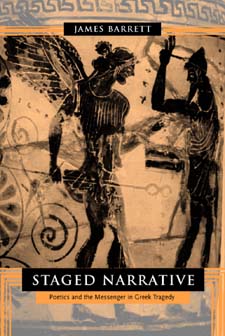 | Title: Staged narrative: poetics and the messenger in Greek tragedy Author: Barrett, James 1953- Published: University of California Press, 2002 Subjects: Classics | Classical Literature and Language Publisher's Description: The messenger who reports important action that has occurred offstage is a familiar inhabitant of Greek tragedy. A messenger informs us about the death of Jocasta and the blinding of Oedipus, the madness of Heracles, the slaughter of Aigisthos, and the death of Hippolytus, among other important events. Despite its prevalence, this conventional figure remains only little understood. Combining several critical approaches - narrative theory, genre study, and rhetorical analysis - this lucid study develops a synthetic view of the messenger of Greek tragedy, showing how this role illuminates some of the genre's most persistent concerns, especially those relating to language, knowledge, and the workings of tragic theater itself. James Barrett gives close readings of several plays including Aeschylus's Persians, Sophocles' Electra and Oedipus Tyrannus, and Euripides' Bacchae and Rhesos. He traces the literary ancestry of the tragic messenger, showing that the messenger's narrative constitutes an unexplored site of engagement with Homeric epic, and that the role illuminates fifth-century b.c. experimentation with modes of speech. Breaking new ground in the study of Athenian tragedy, Barrett deepens our understanding of many central texts and of a form of theater that highlights the fragility and limits of human knowledge, a theme explored by its use of the messenger. [brief] Similar Items |
| 12. | 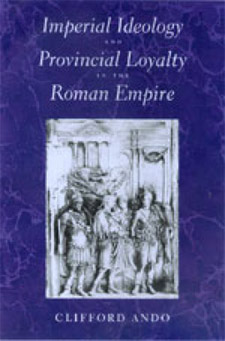 | Title: Imperial ideology and provincial loyalty in the Roman Empire Author: Ando, Clifford 1969- Published: University of California Press, 2000 Subjects: Classics | Classical History | Ancient History | Social Theory Publisher's Description: The Roman empire remains unique. Although Rome claimed to rule the world, it did not. Rather, its uniqueness stems from the culture it created and the loyalty it inspired across an area that stretched from the Tyne to the Euphrates. Moreover, the empire created this culture with a bureaucracy smaller than that of a typical late-twentieth-century research university. In approaching this problem, Clifford Ando does not ask the ever-fashionable question, Why did the Roman empire fall? Rather, he asks, Why did the empire last so long? Imperial Ideology and Provincial Loyalty in the Roman Empire argues that the longevity of the empire rested not on Roman military power but on a gradually realized consensus that Roman rule was justified. This consensus was itself the product of a complex conversation between the central government and its far-flung peripheries. Ando investigates the mechanisms that sustained this conversation, explores its contribution to the legitimation of Roman power, and reveals as its product the provincial absorption of the forms and content of Roman political and legal discourse. Throughout, his sophisticated and subtle reading is informed by current thinking on social formation by theorists such as Max Weber, Jürgen Habermas, and Pierre Bourdieu. [brief] Similar Items |
| 13. | 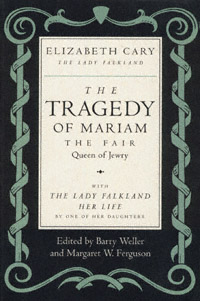 | Title: The tragedy of Mariam, the fair queen of Jewry Author: Cary, Elizabeth, Lady 1585 or 6-1639 Published: University of California Press, 1994 Subjects: Literature | Renaissance Literature | English Literature | Literary Theory and Criticism | Women's Studies | Autobiographies and Biographies Publisher's Description: The Tragedy of Mariam (1613) is the first original play by a woman to be published in England, and its author is the first English woman writer to be memorialized in a biography, which is included with this edition of the play. Mariam is a distinctive example of Renaissance drama that serves the desire of today's readers and scholars to know not merely how women were represented in the early modern period but also how they themselves perceived their own condition.With this textually emended and fully annotated edition, the play will now be accessible to all readers. The accompanying biography of Cary further enriches our knowledge of both domestic and religious conflicts in the seventeenth century. [brief] Similar Items |
| 14. | 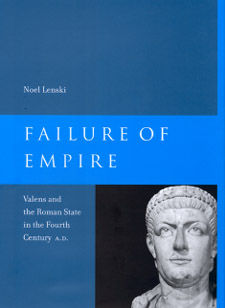 | Title: Failure of empire: Valens and the Roman state in the fourth century A.D Author: Lenski, Noel Emmanuel 1965- Published: University of California Press, 2003 Subjects: Classics | History | Classical History | Ancient History | Classical Politics | Autobiographies and Biographies Publisher's Description: Failure of Empire is the first comprehensive biography of the Roman emperor Valens and his troubled reign (a.d. 364-78). Valens will always be remembered for his spectacular defeat and death at the hands of the Goths in the Battle of Adrianople. This singular misfortune won him a front-row seat among history's great losers. By the time he was killed, his empire had been coming unglued for several years: the Goths had overrun the Balkans; Persians, Isaurians, and Saracens were threatening the east; the economy was in disarray; and pagans and Christians alike had been exiled, tortured, and executed in his religious persecutions. Valens had not, however, entirely failed in his job as emperor. He was an admirable administrator, a committed defender of the frontiers, and a ruler who showed remarkable sympathy for the needs of his subjects. In lively style and rich detail, Lenski incorporates a broad range of new material, from archaeology to Gothic and Armenian sources, in a study that illuminates the social, cultural, religious, economic, administrative, and military complexities of Valens's realm. Failure of Empire offers a nuanced reconsideration of Valens the man and shows both how he applied his strengths to meet the expectations of his world and how he ultimately failed in his efforts to match limited capacities to limitless demands. [brief] Similar Items |
| 15. | 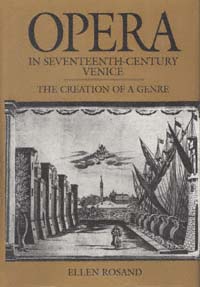 | Title: Opera in seventeenth-century Venice: the creation of a genre Author: Rosand, Ellen Published: University of California Press, 1990 Subjects: Music | Musicology | Opera | European History Publisher's Description: Ellen Rosand shows how opera, born of courtly entertainment, took root in the special social and economic environment of seventeenth-century Venice and there developed the stylistic and aesthetic characteristics we recognize as opera today. With ninety-one music examples, most of them complete pieces nowhere else in print, and enlivened by twenty-eight illustrations, this landmark study will be essential for all students of opera, amateur and professional, and for students of European cultural history in general.Because opera was new in the seventeenth century, the composers (most notably Monteverdi and Cavalli), librettists, impresarios, singers, and designers were especially aware of dealing with aesthetic issues as they worked. Rosand examines critically for the first time the voluminous literary and musical documentation left by the Venetian makers of opera. She determines how these pioneers viewed their art and explains the mechanics of the proliferation of opera, within only four decades, to stages across Europe. Rosand isolates two features of particular importance to this proliferation: the emergence of conventions - musical, dramatic, practical - that facilitated replication; and the acute self-consciousness of the creators who, in their scores, librettos, letters, and other documents, have left us a running commentary on the origins of a genre. [brief] Similar Items |
| 16. | 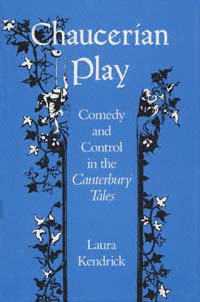 | Title: Chaucerian play: comedy and control in the Canterbury tales Author: Kendrick, Laura Published: University of California Press, 1988 Subjects: Literature | English Literature Similar Items |
| 17. | 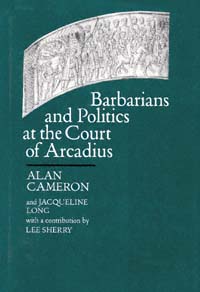 | Title: Barbarians and politics at the Court of Arcadius Author: Cameron, Alan Published: University of California Press, 1993 Subjects: Classics | Religion | Ancient History Publisher's Description: The chaotic events of A.D. 395-400 marked a momentous turning point for the Roman Empire and its relationship to the barbarian peoples under and beyond its command. In this masterly study, Alan Cameron proposes a complete rewriting of received wisdom concerning the social and political history of these years. Our knowledge of the period comes to us in part through Synesius of Cyrene, who recorded his view of events in his De regno and De providentia . By redating these works, Cameron offers a vital, new interpretation of the interactions of pagans and Christians, Goths and Romans.In 394/95, during the last four months of his life, the emperor Theodosius I ruled as sole Augustus over a united Roman empire that had been divided between at least two emperors for most of the preceding one hundred years. Not only did the death of Theodosius set off a struggle between Roman officeholders of the two empires, but it also set off renewed efforts by the barbarian Goths to sieze both territory and office. Theodosius had encouraged high-ranking Goths to enter Roman military service; thus well placed, their efforts would lead to Alaric's sack of Rome in 410. Though Cameron's interest is in the particularities of events, the book conveys a wonderful sense of the general time and place. Cameron's rebuttal of modern scholarship, which pervades the narrative, enhances the reader's engagement with the complexities of interpretation. The result is a sophisticated recounting of a period of crucial change in the Roman Empire's relationship to the non-Roman world. [brief] Similar Items |
| 18. | 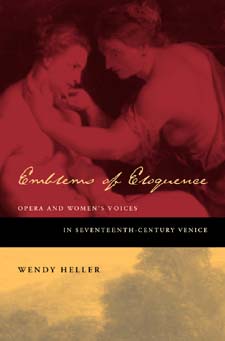 | Title: Emblems of eloquence: opera and women's voices in seventeenth-century Venice Author: Heller, Wendy Beth Published: University of California Press, 2004 Subjects: Music | European Studies | Opera | Classical Music | Women's Studies | Classical Literature and Language | Renaissance History Publisher's Description: Opera developed during a time when the position of women - their rights and freedoms, their virtues and vices, and even the most basic substance of their sexuality - was constantly debated. Many of these controversies manifested themselves in the representation of the historical and mythological women whose voices were heard on the Venetian operatic stage. Drawing upon a complex web of early modern sources and ancient texts, this engaging study is the first comprehensive treatment of women, gender, and sexuality in seventeenth-century opera. Wendy Heller explores the operatic manifestations of female chastity, power, transvestism, androgyny, and desire, showing how the emerging genre was shaped by and infused with the Republic's taste for the erotic and its ambivalent attitudes toward women and sexuality. Heller begins by examining contemporary Venetian writings about gender and sexuality that influenced the development of female vocality in opera. The Venetian reception and transformation of ancient texts - by Ovid, Virgil, Tacitus, and Diodorus Siculus - form the background for her penetrating analyses of the musical and dramatic representation of five extraordinary women as presented in operas by Claudio Monteverdi, Francesco Cavalli, and their successors in Venice: Dido, queen of Carthage (Cavalli); Octavia, wife of Nero (Monteverdi); the nymph Callisto (Cavalli); Queen Semiramis of Assyria (Pietro Andrea Ziani); and Messalina, wife of Claudius (Carlo Pallavicino). [brief] Similar Items |
| 19. | 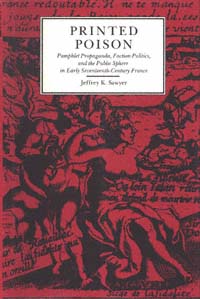 | Title: Printed poison: pamphlet propaganda, faction politics, and the public sphere in early Seventeenth-century France Author: Sawyer, Jeffrey K Published: University of California Press, 1991 Subjects: History | European History | Print Media | Politics | French Studies Publisher's Description: Combining a broad analysis of political culture with a particular focus on rhetoric and strategy, Jeffrey Sawyer analyzes the role of pamphlets in the political arena in seventeenth-century France. During the years 1614-1617 a series of conflicts occurred in France, resulting from the struggle for domination of Louis XIII's government. In response more than 1200 pamphlets - some printed in as many as eighteen editions - were produced and distributed. These pamphlets constituted the political press of the period, offering the only significant published source of news and commentary.Sawyer examines key aspects of the impact of pamphleteering: the composition of the targeted public and the ways in which pamphlets were designed to affect its various segments, the interaction of pamphlet printing and political action at the court and provincial levels, and the strong connection between pamphlet content and assumptions on the one hand and the evolution of the French state on the other. His analysis provides new and valuable insights into the rhetoric and practice of politics.Sawyer concludes that French political culture was shaped by the efforts of royal ministers to control political communication. The resulting distortions of public discourse facilitated a spectacular growth of royal power and monarchist ideology and influenced the subsequent history of French politics well into the Revolutionary era. [brief] Similar Items |
| 20. | 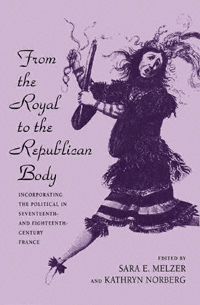 | Title: From the royal to the republican body: incorporating the political in seventeenth- and eighteenth-century France Author: Melzer, Sara E Published: University of California Press, 1998 Subjects: History | European History | French Studies | European Literature | Cinema and Performance Arts | Politics Publisher's Description: In this innovative volume, leading scholars examine the role of the body as a primary site of political signification in seventeenth- and eighteenth-century France. Some essays focus on the sacralization of the king's body through a gendered textual and visual rhetoric. Others show how the monarchy mastered subjects' minds by disciplining the body through dance, music, drama, art, and social rituals. The last essays in the volume focus on the unmaking of the king's body and the substitution of a new, republican body. Throughout, the authors explore how race and gender shaped the body politic under the Bourbons and during the Revolution. This compelling study expands our conception of state power and demonstrates that seemingly apolitical activities like the performing arts, dress and ritual, contribute to the state's hegemony. From the Royal to the Republican Body will be an essential resource for students and scholars of history, literature, music, dance and performance studies, gender studies, art history, and political theory. [brief] Similar Items |